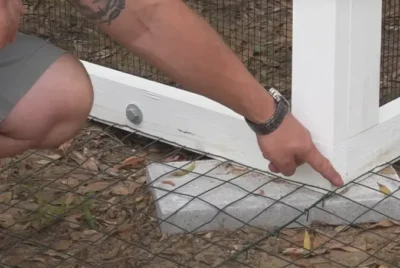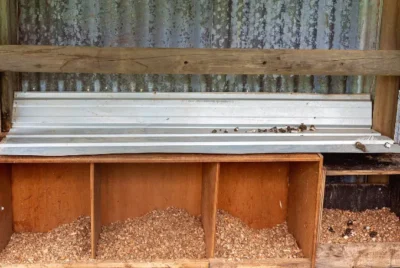How To Fox-Proof and Raccoon-Resistant Your Chicken Coop
Keeping chickens safe from predators like foxes and raccoons is a top priority for backyard poultry keepers. These cunning and determined creatures can pose a significant threat to your flock. However, with the right precautions and strategies, you can fox-proof and raccoon-resistant your chicken coop effectively.
So, in this article, we will explore various measures and techniques to ensure the safety and security of your feathered friends
Why and How Foxes Target Chicken Coops
Foxes target chicken coops primarily for a reliable source of food. Chickens are easy prey for them, and the coop provides a relatively safe and enclosed space to access their prey. Foxes are opportunistic hunters, and a coop full of chickens represents a convenient and predictable food source.
Additionally, foxes often strike during the cover of darkness, leveraging their exceptional night vision to approach and raid coops stealthily. They often dig under coop walls or fencing. Also, foxes are skilled climbers and can scale fences or even trees to access coops from above.
Their slender bodies allow them to squeeze through small gaps or openings in the coop structure. Foxes may also exploit unsecured latches or doors, using their dexterous paws to gain access.
Their cunning nature also allows them to navigate traps and evade capture, making it essential for chicken keepers to fortify their coops with secure locks, sturdy fencing, and deterrents to protect their flock from these resourceful predators.
Fox Proofing Your Chicken Coop

Examine the Latches on Your Coop
Regularly inspect all entrances, including doors, windows, and hatches, for secure and fox-proof latches. Foxes are skilled at opening simple latches, so consider using locks or more robust fasteners that are difficult for them to manipulate.
Read also: The Importance of Heavy-Duty Latches in Protecting Your Chickens From Raccoons
Inspect Your Coop for Any Gaps or Holes
Thoroughly examine the coop’s walls, flooring, and roof for any gaps, holes, or weak points that foxes could exploit. Pay close attention to areas where different materials meet, as these are common entry points. Seal any openings with sturdy materials like hardware cloth or plywood.
Block Entry Points
Foxes can dig, climb, or squeeze through small openings. To prevent digging, bury wire mesh or hardware cloth around the coop’s perimeter at least 12-18 inches deep.
Ensure that fences and walls are high enough to deter climbing, and consider adding a roof or covering to prevent entry from above. Use fine wire mesh or hardware cloth with small openings to block foxes from squeezing through.
Read also: How to Attach Hardware Cloth to Chicken Coop for Ultimate Protection
Use Strong Metal Wiring for the Coop’s Construction
When building or renovating your chicken coop, opt for strong and sturdy materials such as heavy-gauge metal wiring. This wiring should be used for windows, vents, and any other openings in the coop. You must ensure that it is securely fastened to prevent foxes from tampering with it.
Install a Coop Apron around the Perimeter
A coop apron is a buried wire mesh barrier that extends outward from the coop’s walls. This involves burying PVC-coated wire rolled fencing around the coop’s base. You should bury the coop apron at least 12-18 inches deep and extend several feet outward. This prevents foxes from digging their way into the coop, as they cannot tunnel beneath the apron.
Keep the Area around Your Coop Clear
Maintain a clear and open area around your coop. Trim vegetation and remove debris, as overgrown plants and clutter can provide hiding spots for foxes. A well-maintained perimeter makes it harder for foxes to approach undetected.
Add Motion Sensor Lights near Your Coop
Motion-activated lights can be an effective deterrent. Install these lights near the coop entrances and in areas where foxes may approach. When a fox triggers the motion sensor, the sudden illumination can startle them, discouraging further attempts to access the coop.
How To Keep Fox or Raccoons Away From Your Chicken Coop

Create a Barrier of Unpleasant Odors
One effective approach to keep foxes or raccoons away is to create a barrier of unpleasant odors around your chicken coop. Both foxes and raccoons have a keen sense of smell, and certain scents can repel them.
Some common odors that deter these animals include cinnamon, black pepper, cayenne pepper, onion, peppermint, and Epsom salt. You can use these ingredients to make natural repellent sprays and apply them around the coop’s perimeter.
However, be cautious not to irritate your chickens’ respiratory systems, so avoid direct contact with the coop.
Ensure That Your Trash Is Properly Managed and Secured
Foxes and raccoons are opportunistic scavengers, and they are attracted to food sources, including trash. Ensure that your trash bins are properly managed and secured with tight-fitting lids. Avoid leaving food scraps or trash near the coop, as it can attract these animals to your property.
Consider Getting a Large Dog for Your Property
Having a large dog as a guardian on your property can be a natural deterrent to foxes and raccoons. Foxes are often wary of larger animals, and the presence of a dog can discourage them from approaching. However, it’s important to choose a dog breed that is well-suited for guarding and is trained to coexist with your chickens safely.
Adding a Vigilant Rooster to Your Flock
Roosters possess a natural protective instinct and a keen sense of danger. They actively watch for potential threats, including predators like foxes and hawks, and are quick to sound alarms to alert the hens.
In the event of a predator’s approach, a rooster will position himself between the threat and the hens, prepared to defend the flock if necessary. Their presence establishes a pecking order within the flock, reducing conflicts among hens and maintaining order.
Read also: Hawk-Proofing Your Coop: Essential Tips for Poultry Owners
Add Geese to Your Flock
Geese are known for their protective nature and alertness. They act as sentinels, instinctively watching for potential threats and sounding loud warnings in the presence of danger, which benefits both chickens and humans.
Additionally, geese are naturally suspicious of unfamiliar animals and are territorial, making them effective deterrents against smaller predators like foxes and raccoons. Their larger size and formidable presence can discourage potential threats from approaching the coop.
Plus, geese and chickens can coexist peacefully within the same flock, providing companionship and reducing stress.

Collect Eggs Regularly
Both foxes and raccoons are known to be attracted to chicken eggs. To prevent them from raiding your coop for eggs, collect eggs from the nesting boxes regularly, preferably daily. This reduces the incentive for these predators to target your coop in search of a meal.
Frequently Asked Questions
Is it Possible for a Fox to Gnaw Through Chicken Wire?
Yes, it is possible for a determined fox to gnaw through standard chicken wire. Foxes are known for their sharp teeth and agility, which allows them to chew or tear apart weaker wire barriers.
To effectively fox-proof your chicken coop, it’s essential to use heavy-duty wire mesh that foxes cannot easily damage or manipulate.
What is the Minimum Space a Fox Can Squeeze Through?
An adult fox can squeeze through a hole as small as 4 inches or roughly 10 centimeters in diameter. Their flexibility and slender bodies enable them to navigate through surprisingly tight spaces.
Conclusion
Fox-proofing and raccoon-resistant measures are essential for the safety and well-being of your backyard chickens. These cunning predators pose a significant threat to your flock, but with careful planning and proactive steps, you can create a secure environment for your feathered friends.
With the right precautions, you can enjoy the benefits of fresh eggs and contented chickens without worrying about fox or raccoon attacks. Your poultry will thrive in a safe and secure coop, and you’ll have peace of mind knowing you’ve taken the necessary steps to keep them out of harm’s way.
For a more comprehensive guide on advanced chicken coop security strategies, be sure to check out our article about this on our website. This resource will provide you with in-depth insights and additional tips to fortify your coop and protect your chickens.




